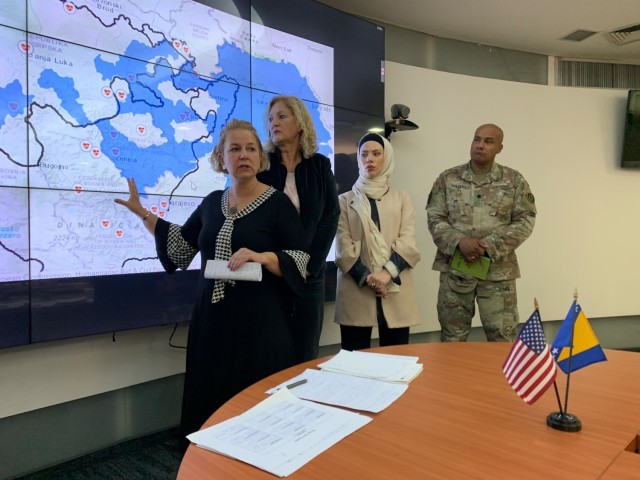U.S., Bosnia-Herzegovina participate in crisis communication tabletop exercise in Sarajevo
By Shannon Bauer

SARAJEVO, Bosnia-Herzegovina – A team of seven American subject matter experts traveled to Sarajevo for a crisis communication workshop and tabletop exercise Sept. 26-28. The event was conducted in coordination with the U.S. Embassy Sarajevo and the U.S. Department of Defense Civil-Military Emergency Preparedness program, under the Defense Security Cooperation Agency’s Institute for Security Governance.
The U.S. team supporting the workshop, made up of experts from the U.S. Army Corps of Engineers and Maryland National Guard, worked with first responders to improve crisis communication and public information in Bosnia-Herzegovina in times of emergency. The workshop’s events included presentations, lessons learned discussions and a culminating tabletop exercise to challenge the more than a dozen participants, representing the Republic of Srpska and Federation of Bosnia-Herzegovina.
The Maryland National Guard has a 21-year partnership with Bosnia-Herzegovina, helping the country build military capability. Their experiences communicating to the public in times of emergency, such as flooding, were especially valuable to the workshop.
The exercise scenario involved a torrential rain in the region of the Sava River (including the Federation and Republika of Srpska) which caused catastrophic flooding and landslides. Participants were asked to develop press releases, complete one-on-one media interviews and host a mock press conference.
“Learning about the U.S. experience was very good for us, as we have many of the same challenges as the U.S. when working with the media and coordinating with multiple agencies throughout a natural disaster type event,” said Majda Kovač, public information officer for the Federation Civil Protection. “We found their knowledge and experience in public information rich and useful.”
Željko Stojanović, public information officer for the Republic of Srpska Civil Protection, said, “The workshop offered a number of practical examples and tips that were simple and direct and that hit the needs for both the Republic of Srpska and the Federation, as both often struggle with resources.”
The crisis communication workshop provided the Bosnia-Herzegovina government an opportunity for continuous improvement in public information skills when responding to natural and manmade disasters in the country and was conducted in cooperation with the Civil-Military Emergency Preparedness program, which supports NATO Partner Nations in building capacity for national-level and all-hazards disaster preparedness.
The CMEP program, executed by the U.S. Army Corps of Engineers, focuses on facilitating inter-ministerial and civil-military cooperation, enhancing Armed Forces capabilities to provide defense support to civil authority and regional / multilateral cooperation to support response to disasters.
“All of the participants were very skilled professionals, and this workshop provided them with the opportunity to collaborate with and learn from colleagues from other organizations,” said Diane Acurio, USACE project leader. “I believe this event was very successful in that it brought together a number of people who will work closely together in future crisis response efforts.”
Acurio has led CMEP events in Bosnia-Herzegovina since 2007, fostering an enduring relationship with emergency response professionals in the country.
